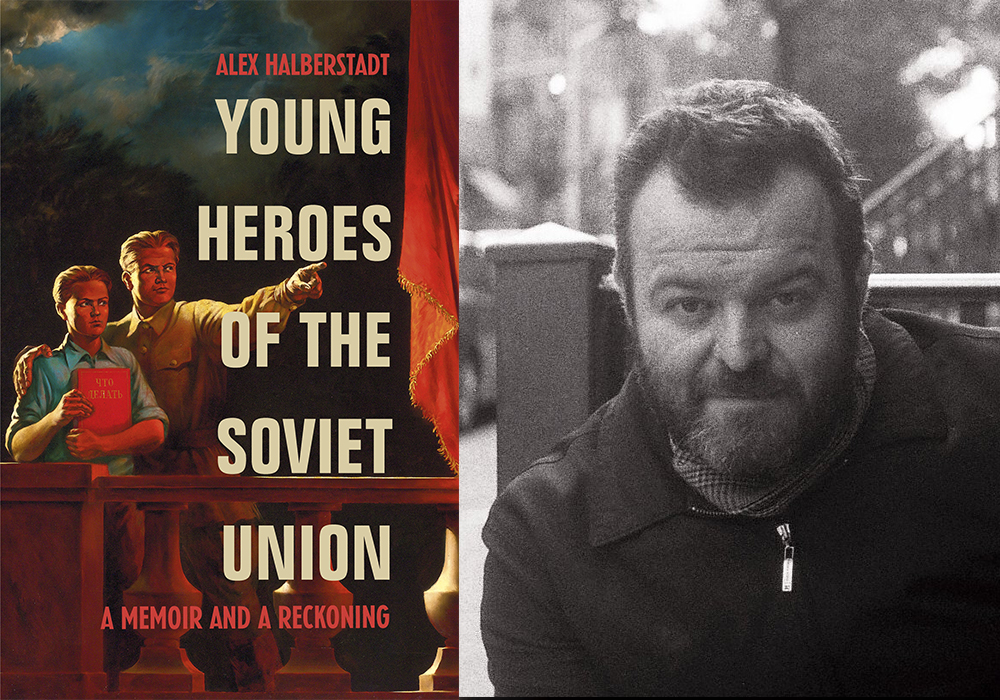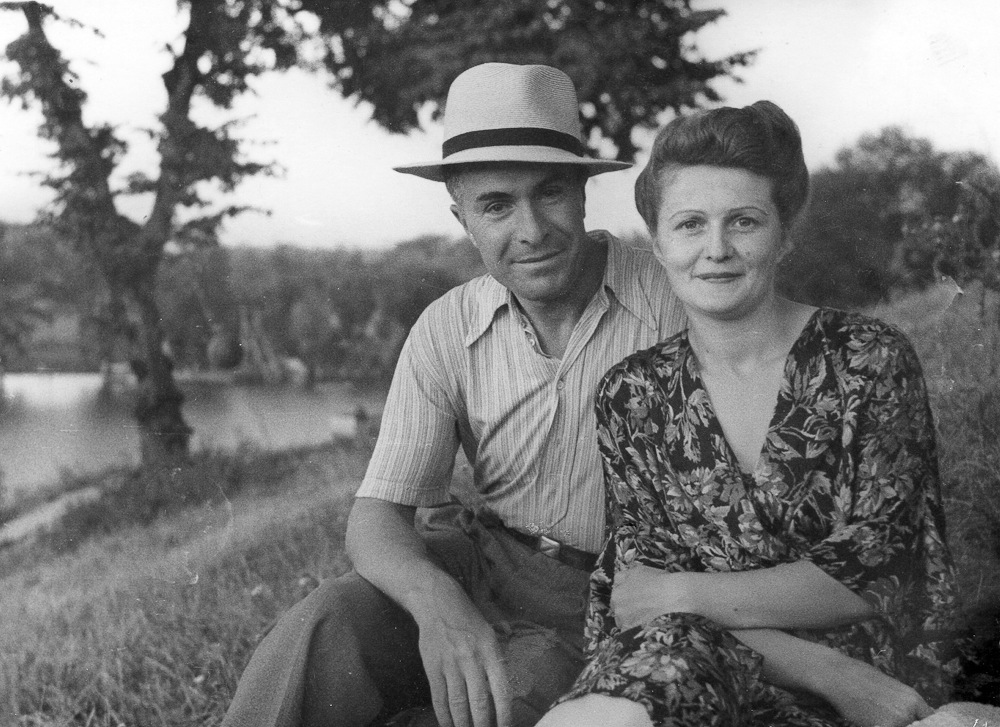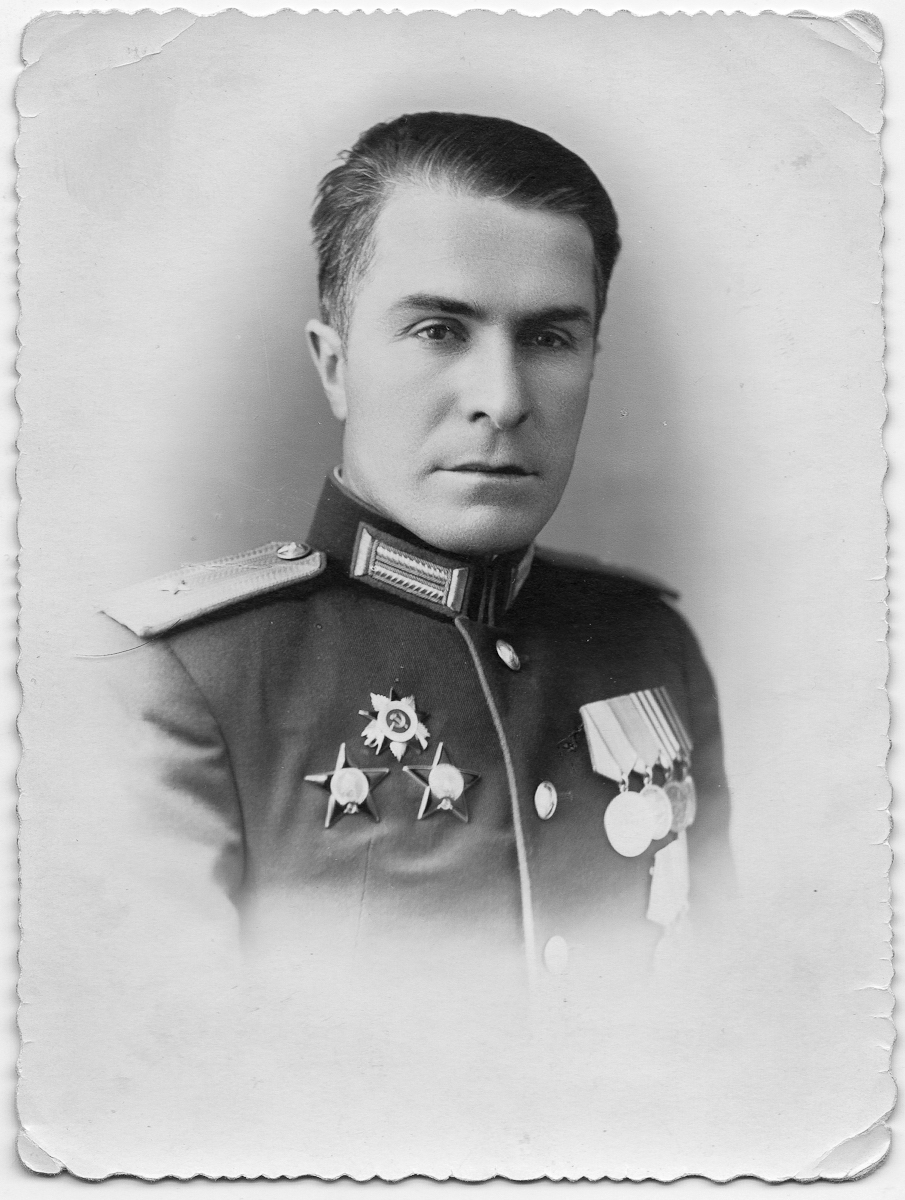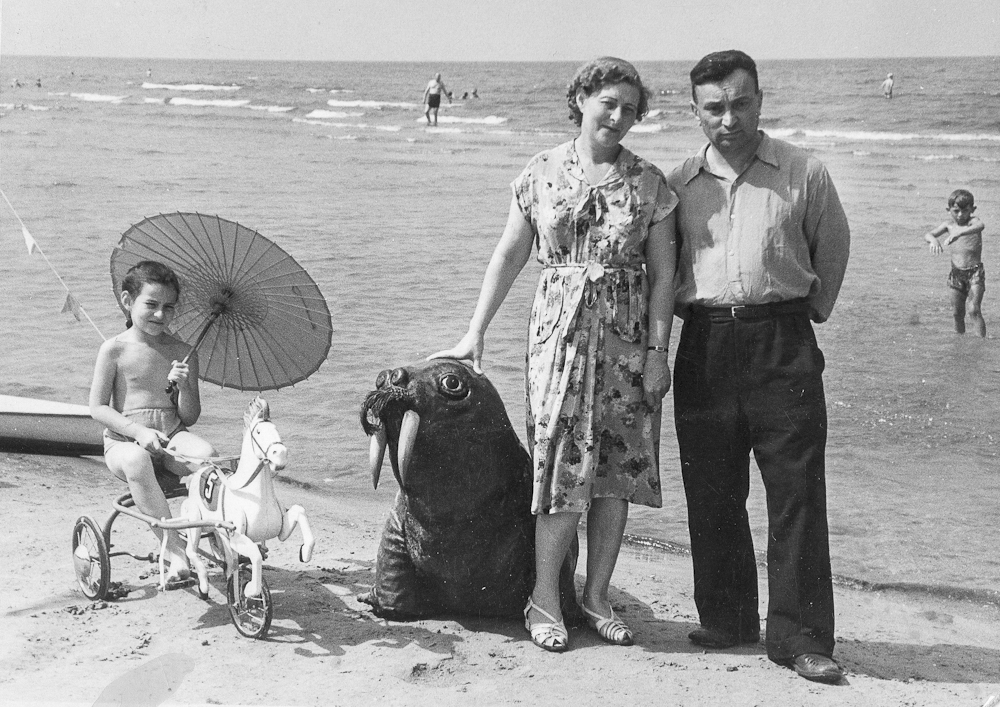Alex Halberstadt is a writer, born in Russia and raised there until he was nine, when his family (or part of it) immigrated to the States. He did the rest of his growing up in Long Island City. Educated at Oberlin and Columbia, he has written all sorts of things, books and reportage and profiles. His previous book, the excellent Lonely Avenue, is a biography of the songwriter Doc Pomus, who co-wrote “Save the Last Dance For Me” and “This Magic Moment” and a list of other lasting hits. The New York Times called the book “taut and affecting.” His newest is titled Young Heroes of the Soviet Union. Unexpectedly, given the title, it is a deeply personal book, an engaging and subtle piece of nonfiction that’s full of history and Alex’s own wit, which can flick back and forth from dry to wet in a very effective way. This new book has had the misfortune to be published during the pandemic-related downturn, a moment when many good writers feel like their new books are vanishing into wells. Halberstadt himself caught Covid a couple of months ago and has been suffering some in isolation. I am glad for a chance to call attention to Young Heroes of the Soviet Union. For this interview, conducted in May, we communicated electronically between Brooklyn, where Halberstadt has lived for the past twenty-six years, and Wilmington, NC.
INTERVIEWER
I remember sitting in a bar with you maybe fifteen years ago, and I told you some story about my grandfather that I thought was interesting. When I was done, you sort of waited a beat and said, “My grandfather was Stalin’s bodyguard.” Which is an unfair trump card to be carrying around in your pocket all your life. Then you told me you’d never met him. I said something like, “Why don’t you go find him and write about it!” Any physically conscious person would have said the same thing. What’s remarkable here is that you actually did it. You went to Ukraine and found him. How is it that you had never met your own grandfather?
HALBERSTADT
My father stopped speaking to his father—my grandfather Vassily Chernopisky—when I was born. There were many sound reasons for him to do this, but mainly he did it because he wanted nothing to do with what his father stood for, which was Stalinism and the power of the Soviet state. My grandfather had been an officer in the secret police for most of his life, and for thirteen years one of Stalin’s personal bodyguards. He was an absent and sometimes brutal father. He was also a gifted photographer, and a really great-looking man obsessed with clothes. When my mother and I left Moscow, when I was nine, we took with us one photo of Vassily and my grandmother Tamara. They are sitting near a lake; he’s wearing a fedora. For years, that was all the proof I had that my grandfather existed. I assumed that he had died sometime shortly after I was born. Then in 2004 my father got a call from a distant cousin who said that Vassily was alive and mentally still with it. That’s when I told you about him at that bar—I had just found out he was alive.
INTERVIEWER
He was living in Ukraine. Is he Ukrainian?
HALBERSTADT
Vassily was Ukranian, the child of beet farmers. When I found him, he was living in Vinnytsia, a medium-sized city in the country’s center. It turned out that he was occupying the same one-bedroom apartment where my father had grown up fifty years earlier. It felt like time had stopped for Vassily fifty years earlier, too.
INTERVIEWER
How had he gone from the beet farm to the secret police? Through the military?
HALBERSTADT
He served in a cavalry unit, and impressed his commanders with his competence and, mainly, by never complaining. He was one of several recruits from the unit chosen to attend the academy, in Moscow, of the OGPU (as the secret police was known at the time). It was considered a serious honor. When he boarded the train to Moscow, it was the first time he had been on a train.
INTERVIEWER
When I hear cavalry officer, Ukraine, I think about Isaac Babel’s stories, even if Babel was fighting a decade before. Are they meaningful to you?
HALBERSTADT
Like many Russians, I love Babel’s stories, particularly Odessa Tales. But they seem to occupy a different universe than Vassily’s—Babel’s stories were Jewish, worldly, and uproariously funny. To me they epitomize the quiet but very tart humor of what in Soviet times was called the Jewish intelligentsia. But that’s my mother’s family. Vassily was Orthodox, and I’m quite sure he never read Babel—in the almost twenty years that he was married to my grandmother, he read only one book, which for some reason was Pot-Bouille, a satirical novel by Émile Zola. He kept in on the nightstand by his bed. My grandmother did not know if he had ever finished it.
INTERVIEWER
So, can we assume that Vassily rose through the ranks of the OGPU in the same way he’d done in the army?
HALBERSTADT
He spent nine years as an agent of the secret police, which went from being called OGPU to NKVD and, later, KGB. These were the years of the Great Terror, when nineteen million Soviet citizens were arrested, and roughly seven million were executed, many by quota. Vassily was a major, overseeing 55 men at Lubianka, which was the secret-police prison in Moscow. During this time, the entire secret-police apparatus was purged, twice, and it is remarkable that Vassily survived. It was in 1941, when he was at the front, as part of an NKVD division charged with shooting deserters, that he received a telegram ordering him to report to the Kremlin, where he was made a bodyguard.
INTERVIEWER
The Terror, the gulags, a secret-police prison where he was in command, then charged with shooting deserters, and the whole time Vassily remained fiercely loyal to the state—your grandfather must have done terrible things.
HALBERSTADT
Undoubtedly. Vassily told me about participating in the ethnic cleansing of the Crimean Tatars, and witnessing the abduction of young women when he was riding in a limousine with Lavrenty Beria, who was head of both the secret police and the Gulag. I came to realize that these were just the incidents he chose to reveal, and how much more he must have seen and done. A dynamic of our time together was my attempt to get him to talk about these things, and his attempt to evade my questions. I felt very much like a journalist when we spoke, in the sense that our encounter was a kind of battle, and I was aware of our attempting to manipulate one another. The book became in part about the impossibility of understanding the past. I came away thinking that to understand what life was like in the Soviet Union in the late 1930s is really impossible for someone living in the contemporary world. The memoirs and documents and films can get you only so close.
INTERVIEWER
On the other hand, you got closer than that. You found and interviewed the man, even if, as you tell us, his answers involved a lot of static. I will ask about when you met him, or what it was like to encounter him in a room for the first time. But before that I want to throw a few non-sequiturs at you. Let me know when you’re ready.
HALBERSTADT
I’m ready.
INTERVIEWER
Do you remember a vinyl album from the late 1980s. It was white, I think. Inside there was a fold-out with a photograph that showed about 50 musicians, most dressed in black, standing in the snow. It was a double lp with about fifty songs on it. Almost all of them were terrible, but they were all wonderful. The leader of the best-known band was a guy named Boris who looked a bit like Klaus Kinski. He spoke about having to re-use piano wires as guitar strings, and other more serious hardships that rock bands suffered under the Soviets. I almost never listened to the record, but owning it and showing it to people were really important. Did I dream that?
HALBERSTADT
The band is called Aquarium, and the singer who looked like Kinski is Boris Grebenshchikov. BG, as he’s known in Russia, is genuinely awesome.
INTERVIEWER
It never even occurred to me that you might let me down on that.
HALBERSTADT
The whole topic of Russian rock is fascinating. I think your description—”almost all of them were terrible, but they were all wonderful”—is how I hear it, too, though in a different way. Russian pop always elevates lyrics above music, and often you have these incredibly literate songs played and sung in awkward and painfully derivative styles.
INTERVIEWER
Next question: Is it true that once, partly as a way of getting to Russia and Ukraine to do research for this book, you took an assignment to find and interview a famously reclusive mathematician who had essentially proved that the universe is a sphere?
HALBERSTADT
Yes, I took an assignment to track down Grigory Perelman, who had proven the Poincaré Conjecture, the first conjecture ever made in a branch of geometry known as topology. He had just refused the Fields Medal and a million-dollar prize from an American math foundation, and was living with his mother in her tiny apartment on the outskirts of St. Petersburg. Perelman was a kind of monk—he believed that fame and money were a corruption of a pristine, purely intellectual discipline. I interviewed a number of his teachers and former friends, but he wouldn’t talk to me, or anyone. I recall at one point following him into a supermarket.
INTERVIEWER
I know that you’ve been sick for a while with what is almost certainly Covid-19. One of the places worst hit by the pandemic seems to be Russia, although the information coming out is fuzzy. You have close family there—have you communicated with them recently?
HALBERSTADT
I’ve spoken to my half-sister and some friends in Russia since the pandemic took hold. According to official estimates, the country is now fourth—behind the US and Brazil—in the number of Covid-19 cases. But the government there has tried hard to downplay these numbers, and I suspect that the underreporting may be more extreme in Russia than in many other countries.
INTERVIEWER
Did your contacts tell you anything about what’s going on?
HALBERSTADT
I heard that a spokesman for the Russian Orthodox Church, in announcing that church services would continue, explained that viruses don’t kill people, God does. Keep in mind that kissing icons is part of the Orthodox service, and that many of the churchgoers are elderly. There’s also a constant flow of disinformation from the state, which has tried to downplay the severity of the outbreak. Popular television doctors are telling people not to worry. It’s similar to the rhetoric coming from the government of Bolsonaro and, to a lesser extent, the White House.
INTERVIEWER
Do we know anything about the doctors and nurses who are falling out of windows?
HALBERSTADT
A television station in the Siberian city of Krasnoyarsk reported that an acting head of a hospital fell out of a window during “a contentious meeting with local health officials.” A doctor in Voronezh “fell” after posting a video about a shortage of protective equipment at his hospital, and being forced to work after having tested positive for the coronavirus. He later retracted the allegations–after he fell out of the window. The Russian way of dealing with public dissent is modeled by the federal government and widely adopted by regional governments and local organizations and even private citizens. It is disheartening.
INTERVIEWER
Please tell us about meeting Vassily.
HALBERSTADT
When I called him for the first time and introduced myself, he said he didn’t have a grandson. I think he was surprised by the call’s coming out of the blue, after all those years. Of course he eventually remembered. When I met him, he wore this pressed, worn-out blazer for the occasion, and he embraced me and teared up. I recognized him from the one photo I had. For some reason I actually took it out and showed it to him, like I was presenting my credentials. During our time together I was aware of how conflicted he was—I think he badly wanted to tell me about his life, and at the same time tried to manage my impression of him by withholding and then doling out information. And yet each of us wanted to be known by the other, to connect.
INTERVIEWER
The parts involving your grandfather take up only one section of the book. Would you say something about the rest of it? There are pages about your family and about modern Russian history. How does it all fit together?
HALBERSTADT
After I met Vassily and had some time to process what he’d told me, I realized that I had misunderstood the story of my family. Our relationships had been shaped more fundamentally by history than by our personalities, and so much about who we were and how we carried ourselves in the world had essentially been predetermined by where and when we were born. At that point the book opened up—I wrote about my maternal grandparents, Lithuanian Jews who lost their families during the war, about my parents, and about growing up in Moscow and, later, in New York. The book is preoccupied with the idea of what it means to have this history accrue and live inside us, and the strange ways it separates and connects us.
INTERVIEWER
Make that specific for me?
HALBERSTADT
In the last section I write about traveling to the Volga with my father, ostensibly to go fishing, and visiting a place called Selitrennoe, where the Mongol army that overran Russia in the 13th century and occupied it for more than 250 years built its capital. And I write about new research in epigenetics that demonstrates the intergenerational transmission of trauma. The last section grapples with how trauma can shape not just a family but an entire society.
INTERVIEWER
What would it have been like for you, as a queer writer, had your family not gotten you out of Russia? Does that category exist there? I know it’s an ignorant question. If I were to Google “openly queer writers in Russia,” what would I find?
HALBERSTADT
This is not an impossible experiment.
INTERVIEWER
Okay, I performed it. Everyone they mentioned was dead.
HALBERSTADT
You noticed that, too?
INTERVIEWER
But surely there must be voices, if small.
HALBERSTADT
There are in fact many wonderful queer writers living and writing in Russia. Dmitry Kuzmin, for example, is one of the country’s best-known poets. The main issue is that homophobia is more than just an aspect of the culture; the Kremlin uses it as part of a strategy to demonize minorities and maintain its hold on power. A problem arises when a queer writer reaches a certain level of recognition and begins to criticize the state, which any queer person with an audience and a conscience would be compelled to do. They risk having their books and other writing censored or suppressed, then harassment and arrest. Many of Russia’s best-known queer writers live abroad. My friend the New Yorker writer Masha Gessen, who is an outspoken LGBTQ activist, decided to leave Moscow, in part because a member of the State Duma threatened her family on television. So it’s really a problem of becoming a vocal dissident in a mafia state.
INTERVIEWER
Before we stop, what music are you listening to in quarantine?
HALBERSTADT
I’ve been listening to a lot of reggae and lovers rock, and music from Senegal and Mali—Salif Keita, Orchestra Baobab, Amadou and Mariam, Baaba Maal. The other night I walked into a great record store here in Red Hook—it’s called Record Shop—that had opened for a few hours, and bought a vinyl copy of Lou Reed’s New York. I hadn’t heard it in years. I got home, turned out the lights, and listened to it all the way through. It was a really glorious 58 minutes. I needed it. Often there’s something kind of shoddy and broken about Reed’s solo stuff, which matches our moment, but it is shot through with genius.
INTERVIEWER
I have been listening to Lou Reed more than anything else since the virus came. He is perfect company for quarantine.
HALBERSTADT
Tell me why.
INTERVIEWER
Lou was born in quarantine. His spirit animal was a cockroach. He got only more interesting as he aged. I mourn his death, but that he lived into his seventies is medically astonishing. I’ve been playing Songs for Drella, New Sensations, Street Hassle (the live version of “Shooting Star”–with audience noise muted– is enormous). Also his last record, a collection of Tai Chi meditations . . . It bookends with Metal Machine Music from almost thirty years earlier. Starting in chaos, ending in peace.
HALBERSTADT
I love that last album, too.
INTERVIEWER
Let’s stop there, in agreement. I hope your health continues to improve.
HALBERSTADT
Thanks John. Good talking to you. Please be well.
John-Jeremiah Sullivan is a contributing writer for the New York Times Magazine and the Southern Editor of The Paris Review.




